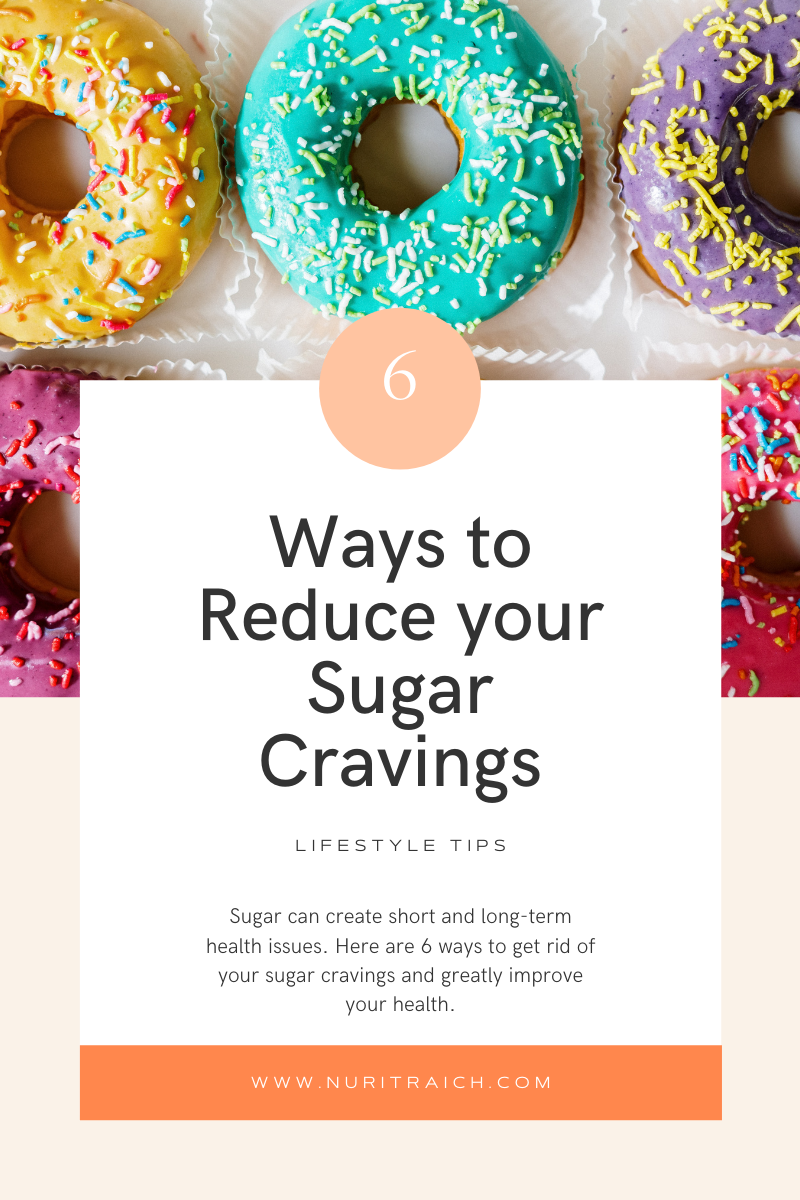6 Ways to Reduce Sugar Cravings
Have you ever experienced the following?
Feeling confused or disorganized and finding it hard to focus or put your thoughts into words (like your memory and brain are not as sharp as they used to be).
An overall feeling of tiredness or lack of energy.
Finding it hard to fall asleep, hard to stay asleep, or you wake up too early and can’t seem to be able to get back to sleep. You may even still feel tired when you wake up.
Bloating, irritability, hair loss, palpitations, mood swings, infertility.
Stomach aches, gas, heartburn, and other digestion issues.
Yes?
The good news is there is one culprit in your diet that could be causing or worsening all of the above.
SUGAR. Yes, sugar.
If you have sweet cravings, you are not alone. A lot of us do, (me included! Which is why I love a piece of dark chocolate after dinner).
But what most people don’t realize is how much sugar they are actually consuming in a day.
The American Heart Association recommends eating no more than:
25g of added sugars per day for women
38g of added sugars per day for men
But on average, in America, people consume 82 grams daily, which means 15% of their calories come from sugar.
How is this possible? Even on an apparently healthy diet, you can go over:
Breakfast – yogurt with granola = 19g
Lunch – salad with balsamic vinaigrette and candied pecans = 15g
Snack – a few squares of dark chocolate for an afternoon pick me up = 10g
Dinner – chicken with honey-roasted carrots for dinner = 21g
TOTAL= 65g of sugar for what seemed a day of healthy eating!
And the worst part is, so many go through life with uncomfortable, chronic symptoms they can’t get to the bottom of.
Consuming too much sugar may cause everything I mentioned above and more:
Memory problems
Irritability
Joint pain
Insomnia
Weight gain
Acne
Eczema
Psoriasis
Rosacea
In the long run, excess in sugar consumption has been linked to obesity, hypertension, diabetes, cardiovascular disease, many types of cancer, and inflammation.
6 Ways to Reduce Sugar Cravings
The good news is, you have the power to not only prevent that but to also feel better now. And here’s how.
Focus on eating whole, unprocessed foods. Avoid all foods with added and refined sugars.
These include packaged foods such as fruit juices, soda, candy, cookies, baked goods, flavored yogurts, dressings, sauces, and condiments. Check the ingredient label for common forms of added sugars including cane syrup, sugar cane, high-fructose corn syrup, and more.
Boost your protein at breakfast
Protein can help stabilize your blood sugar and keep you feeling full—especially when consumed in the morning. Try getting in at least 15-20 grams of protein to start the day to curb appetite and cravings later on.
Swap refined carbs for healthy fats
When removing added sugars, it can help to bring in more healthy fats through foods like nuts, seeds, and avocados. Fats can help by keeping you full for longer and helping to curb your sugar cravings. Try adding 1-2 tbsp of coconut oil to your morning coffee or pairing fruit with your favorite nut butter to get more healthy fats in.
Add in more leafy greens
Leafy greens such as kale, collard greens, arugula, and spinach can provide your body with essential vitamins and minerals that become depleted when you regularly consume sugar. Once you replenish these nutrients, it can often help improve energy. Try to aim for at least 2-3 cups of leafy greens at each meal.
Drink more water
Set a goal of at least 2-3 liters of fluid each day to help your body detox and allow for swift elimination through the body.
Move your body
Exercise serves as an effective way to help manage blood sugar and stress levels. Opt for at least 20-30 minutes of heart-rate raising physical activity each day.
Try these out and you will see that in no time some of those health concerns you had, start to disappear and you may even feel more energized, have improved mental clarity, and lose excess weight.
For more inspiration…
check out this no-sugar chocolate walnut cookie recipe
Salted Chocolate Walnut No-Sugar Cookies












A delicious dairy-free beverage with the perfect balance of berries, protein and healthy fats so you can have great energy for hours.